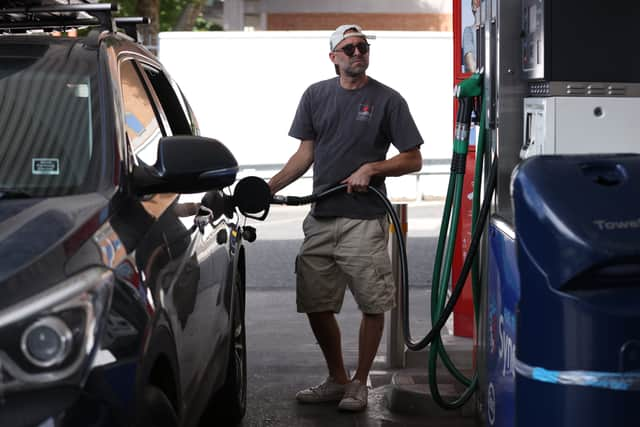UK inflation falls to 9.9% in August after petrol prices decline - but rate still close to 40-year high
and live on Freeview channel 276
The rate of inflation fell for the first time in nearly a year in August as lower diesel and petrol prices took some pressure off struggling households.
The Office for National Statistics (ONS) said Consumer Prices Index inflation reached 9.9% in the year to August, down from 10.1% the previous month, but it still remains close to its 40-year record.
Advertisement
Hide AdAdvertisement
Hide AdExperts had expected the figure to be unchanged between the two months.


What is inflation?
Inflation is what goods and services are worth in a country. If it is higher, that means everyday essentials such as food are more expensive.
The soaring rate reflects the current cost of living crisis, with millions of people struggling with rising prices across the board including energy bills, petrol prices and grocery costs.
Rising food prices made the largest upward contribution to the change in inflation.
Why did the inflation rate fall?
Advertisement
Hide AdAdvertisement
Hide AdThe latest figures show the inflation rate has decreased by 0.2 percentage points compared to July, when it hit 10.1%.
That was the largest figure since 1997 and drew fears from the Bank of England (BoE) Governor that the UK economy could be heading for a 15-month recession.
The ONS said: “The easing in the annual inflation rate in August 2022 reflected principally a fall in the price of motor fuels in the transport part of the index.
“Smaller, partially offsetting, upward effects came from price rises for food and non-alcoholic beverages, miscellaneous goods and services, and clothing and footwear.”
Loading....
Advertisement
Hide AdAdvertisement
Hide AdThe 6.8% drop in fuel prices was the highest since between March and April 2020, the early days of the pandemic when oil prices briefly went negative on some markets.
But George Lagarias, chief economist at accountancy Mazars, warned that it will be some time before inflation truly starts dropping off.
He said: “Higher energy prices for all the previous months have fully fed into most supply chains and it will take months of lower oil for end-consumer prices to meaningfully come down again. Inflation may well remain a central theme until at least the end of the year.
“However, input costs have begun to drop and we should see this feeding into general prices eventually.”
Advertisement
Hide AdAdvertisement
Hide AdThe figures mark a positive trend for the first time in more than a year as inflation has increased every month since September 2021, according to the official figures, piling pressure on households across the country.
Will it affect your money?
Rising inflation indicates that the cost of goods and services is rising. This means your money will not count for as much as it did before.
With inflation hitting 10.1% in July, households were seeing prices rise at the fastest rate for years - but with the rate dropping to 9.9%, it means your cash will go a little bit further.
Prices on everyday items such as food and petrol will remain high for now though, as 9.9% is still very high historically.
Advertisement
Hide AdAdvertisement
Hide AdWorker’s wages are stagnating as well, as they fail to keep pacing with soaring inflation.
Loading....
Data from the ONS revealed on Tuesday 13 September, that workers are facing a "real terms" pay cut.
The Bank of England upped interest rates to 1.75% to try and tackle soaring inflation.
If you have lots of savings put away then it is good news, but it means higher monthly mortgage repayments for first-time buyers.
Will inflation rise again?
Advertisement
Hide AdAdvertisement
Hide AdExperts believe that the support on energy bills announced by the Government last week will ensure that inflation does not reach the concerning highs that had been forecast.
According to one prediction, CPI inflation could have peaked above 20% as energy bills continued to rise.
However, bills will be capped at £2,500 per year for the average household for the next two years, new Prime Minister Liz Truss announced.
Without that support bills had at most been forecast to rise to £7,700 for the average family.
Advertisement
Hide AdAdvertisement
Hide AdYael Selfin, chief economist at consultancy KPMG UK, said: “The new measures announced by the Government to cap energy prices for households at £2,500 could see inflation peak at a more modest 10.5% in October.
“However, with inflation in near double digits, the combination of expected tax cuts and support measures for households may prompt the Bank of England to take a more hawkish stance to avoid higher inflation further down the line.
“This may result in steeper rate rises and higher rates to counteract the inflationary impacts of the expected fiscal largesse.”
Comment Guidelines
National World encourages reader discussion on our stories. User feedback, insights and back-and-forth exchanges add a rich layer of context to reporting. Please review our Community Guidelines before commenting.
